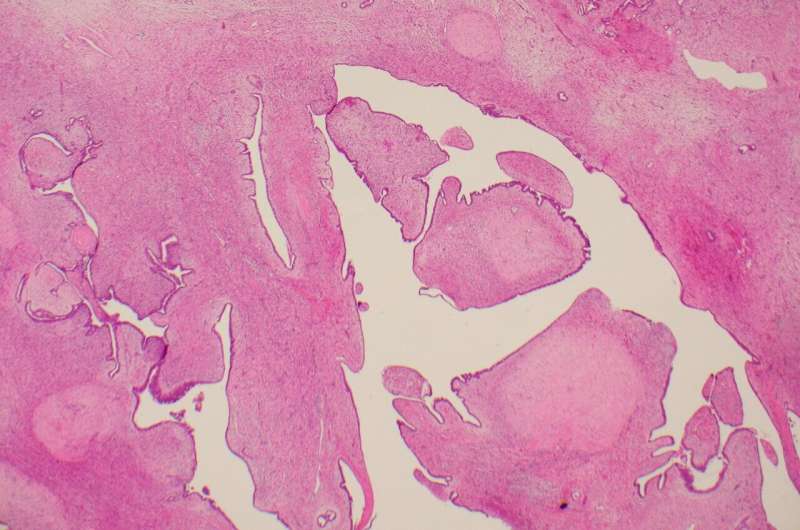This article has been reviewed according to Science X's editorial process and policies. Editors have highlighted the following attributes while ensuring the content's credibility:
fact-checked
peer-reviewed publication
trusted source
proofread
Biomarkers discovered for difficult-to-diagnose breast tumor

The epigenetic 'signature' of a rare, hard-to-diagnose breast tumor has been found by scientists at the Garvan Institute of Medical Research. The discovery could lead to improved treatment guidelines and better outcomes for patients with this rare disease.
Accounting for less than 1% of breast tumors, phyllodes tumors can be difficult to diagnose due to their similarity under the microscope to other types of breast tumors. Most phyllodes tumors are benign, but 10% are malignant. Accurate diagnosis is crucial for effective treatment, as misdiagnosis results in inappropriate or delayed treatment.
The standard diagnosis of tumors comes from pathology analysis of cell patterns but researchers at Garvan have found that new epigenetic-based DNA markers may give additional information for diagnosis.
Epigenetic changes affect whether gene activity is turned up or down without altering the DNA sequence, and can be influenced by environmental factors. A common epigenetic mechanism is DNA methylation, where molecules called methyl groups attach to parts of DNA, which can change gene expression.
"The current way of diagnosing phyllodes tumors is to analyze their cellular features under a microscope. But this technique means they can be misdiagnosed as cellular fibroadenomas, sarcomas or metaplastic breast cancer, tumor types that may look the same but have very different growth rates, prognoses and treatment pathways. Our epigenetic approach, looking at DNA methylation patterns, provides a new layer of information to add to traditional pathology," says Dr. Ruth Pidsley, co-senior author of the study and Leader of the DNA Methylation Biomarkers Group at Garvan.
The findings were published in the Journal of Pathology.
Diagnostics informed by epigenetics
Analyzing samples from 33 patients, the researchers found that phyllodes tumors exhibit a unique DNA methylation pattern, allowing them to be distinguished from other cancers.
"In addition to finding this new epigenetic signature, we identified an additional methylation pattern that could be used to differentiate malignant phyllodes tumors from benign cases. We also developed an algorithm that reclassified originally misdiagnosed samples," says Dr. Braydon Meyer, Research Officer in the Cancer Epigenetics Lab.
"Altered DNA methylation patterns have been instrumental in diagnosing other cancer types, showing the broader potential of epigenetic biomarkers in precision cancer diagnosis and personalized treatment," says Associate Professor Clare Stirzaker, Leader of the Cancer Epigenetic Biomarker Group and co-first author on the paper.
The new understanding could lead to improved diagnosis and outcomes. "Getting the diagnosis right means patients can receive the most appropriate treatment, improving chances of survival for those with aggressive tumors and avoiding unnecessary treatments for those with benign ones," says Professor Sandra O'Toole, co-senior author and a senior pathologist at Garvan.
"Disruption to epigenetic processes, such as DNA methylation patterns, is a recognized hallmark of cancer and can vary significantly between cancer types, allowing a unique cancer forensic signature," says Professor Susan Clark, co-senior author and Head of the Cancer Epigenetics Lab at Garvan.
"Harnessing the power of cutting-edge epigenetic technologies, like Digital Droplet PCR, our next step will be devising a sensitive epigenetic-based PCR test to detect phyllodes tumors that could be routinely used in pathology laboratories."
More information: Braydon Meyer et al, Detailed DNA methylation characterisation of phyllodes tumours identifies a signature of malignancy and distinguishes phyllodes from metaplastic breast carcinoma, The Journal of Pathology (2024). DOI: 10.1002/path.6250



















